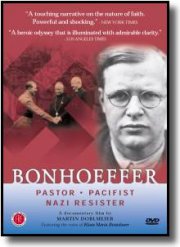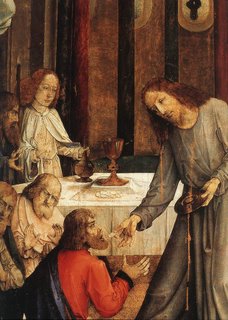
Ich Bin Ein Newfoundlander
You'd have to be a stone not to have been moved by the victory of the Gushue rink at the Olympics today, or the scenes in St. John's afterward. Thanks, boys, for making all our days.
Musings about theology, pop culture, biblical studies, politics, and other stuff.

 With Lent just around the corner, many Christians turn to the question of Lenten disciplines (click here for a fabulous resource). Relatively few, however, see such disciplines as political practices that both constitute and substantiate a Christian selfhood. In this regard, Jamie Smith offers Michel Foucault as a somewhat unlikely ally (perhaps akin to Merold Westphal's invocation of Freud, Marx, and Nietzsche as "atheists for Lent"), and furthers our engagement below with Romans 12:
With Lent just around the corner, many Christians turn to the question of Lenten disciplines (click here for a fabulous resource). Relatively few, however, see such disciplines as political practices that both constitute and substantiate a Christian selfhood. In this regard, Jamie Smith offers Michel Foucault as a somewhat unlikely ally (perhaps akin to Merold Westphal's invocation of Freud, Marx, and Nietzsche as "atheists for Lent"), and furthers our engagement below with Romans 12:I suggested that Michel Foucault’s critique of our contemporary "disciplinary" society echoed St. Paul’s concerns about accommodation to the forces of pagan culture. Like Morpheus in that respect, Christ’s redemption also frees our minds — and hearts and imagination — from the controlling forces that want to enslave them to other ends. The same call is repeated here in Romans: we are not to be conformed to "this world," but, rather, we are to be transformed through renewing our minds. Foucault would utter a hearty "Amen!" to Paul’s critique of "conformity" here. So both Paul and Foucault preach a message of freedom that leads them to be critical of what we might call "the culture of empire."
However, today I want to qualify this by explaining why I think that freedom is a bad idea. Or more specifically, since it doesn’t really matter what I think, I want to suggest that according to the New Testament, what Foucault calls "freedom" is just one more idolatry. While Paul and Foucault might be similar in their critique of the current configuration of our "disciplinary" society, what they envision as an alternative is quite different.

"We do not aim at a conclusion but an opening. We do not seek a closure but an opening up." - John D. Caputo
Welcome to this group, I suppose. The Agnostic Christian Reformed Church was an insidious and nebulous idea, forged by myself and the Church’s cofounder, Sir Trevor Tuininga, Esq. Thus far, it has proven to be a classical example of one of my great ideas: a fantastic name with fantastic hopes attached to it, but without any real goal orpragmatic manifestation in sight. Hopefully, the formation of this group will be a step in a different direction… a motion forward into life, as it were. With any luck, the scope of conversation will broaden somewhat, and ideas will manifest themselves on this board; hopefully, this will provide a forum for discussion that the insecurities of ortho-doxy cannot allow… life must remain both alive and believable.
Gods be praised if anything constructive or even mildly entertaining comes of this,
Daniël
 Bonhoeffer
Bonhoeffer"... to live in the climate of authentic spiritual discipline is to be ‘re-educated’. To adore God for God’s own sake, to bring one’s sins daily before God and the neighbour, to make one’s own the language of Scripture, especially psalmody – all this apparently irrelevant activity is part of opening ourselves up to the transforming word. It is useless and worse than useless when it becomes a way of protecting believers or of denying the acuteness of the world’s pain; so, when the Confessing Church began, step by step, to ‘normalise’ its relations with the Reich, Bonhoeffer spoke out against it as he had spoken out against the state church of the mid-thirties. But this does not mean that he thought the disciplines of Finkenwalde had been a mistake or a false start.
"In a context where, as we are so often reminded, spirituality has become a major interest, Bonhoeffer obliges us to ask what the transforming potential is of any practice or tradition. Does it transform only the individual’s sense of well-being? Then it is merely ‘piety’. But if it enables each believer to stand alongside other and alongside the forgotten, it is on the way to allowing the action of God to make itself manifest. And that is the entire point of spiritual discipline – not the cultivation of a private self, but the renewal of the world by God, a transformation of all the conditions of human speaking and relating. ‘The event of Whitsuntide thus does not consist primarily in a new religiousness, but in the proclamation of a new creative act of God…It is not for a moment a matter of putting the religious before the profane, but of putting God’s act before both religious and profane’ (The Way to Freedom, 47).
"

"... I believe that much of the Christian confusion over globalization results from a neglect of the Eucharist as the source of a truly Catholic practice of space and time. Globalization marks a certain configuration for the discipline of space and time; I would like to juxtapose this geography with another geography, a geography of the Eucharist and its production of catholicity.... I will argue that globalization is not properly characterized by mere fragmentation, but enacts a universal mapping of space typified by detachment from any particular localities. This is not a true catholicity, however, for two reasons: first, this detachment from the particular is actually used as a discipline to reproduce divisions between rich and poor, and second, it produces fragmented subjects unable to engage in a catholic imagination of space and time. [I then show] that the Eucharist produces a catholicity which does not simply prescind from the local, but contains the universal Catholica within each local embodiment.... In the complex space of the body of Christ, attachment to the local is not a fascist nostaligia for gemeinschaft in the face of globalization. Consumption of the Eucharist consumes one into the narrative of the pilgrim City of God, whose reach extends beyond the global to embrace all times and places."
Interested in reading the rest? Go here.
The Catholics had asked me to speak about liturgy as moral formation, but I thought that very way of putting the matter was a mistake. Liturgy is not something done to provide moral motivation. The liturgy is how the church worships God and how from such worship we become a people capable of being an alternative to the world. That is why the language of the liturgy is so important. Nothing betrays the love of God more than the inelegance of the language Christians use in their worship. Some Christians seem to think we can attract people back to Christianity if we try to compete with TV, but when you do that you have already lost. The only result is that Christian worship becomes as banal and ugly as the rest of our lives.
I think it would be terrific if on entering a church people would think, "This is very frightening." God, after all, is frightening. Recently, I had a debate about the interpretation of the Bible at Southeastern Seminary in Wake Forest. One of my graduate students, a Roman Catholic, went with me. When we entered the church where the debate was to be held, she said, "Wow, is this someone's living room?" So "fundamentalists" want to make people feel at home--a home, moreover, that looks more like the living rooms of the 1950s. It is no wonder you are tempted to put an American flag in such "sanctuaries," because at least the flag adds some color. Unfortunately, the colors, at least when they are part of the same piece of cloth, are not liturgically appropriate.
Read the rest of the interview here.
I think Daniel's comment (if I read between the lines) gets at the rather pathetic ways churches bend over backwards to be "culturally relevant" (and in doing so become less relevant to him). Someone once told me that when the church tries to be relevant, it only shows how "irrelevant" it really is. I would add to Hauerwas' "1950s living room" churches that imagine sacred space along the lines of AA meetings, movie theatres, and shopping malls--all in the name of being relevant or "seeker friendly". I wanted to blog about this earlier in the year after visiting a good friend's church complex which was built like a corporate HQ, with a movie theatre-type sanctuary, individual lift-up seats, coffee cup holders instead of bible and hymnbook racks, and nary a symbol in sight. It was impressive, in a non-churchy way. (Now, of course I'm only talking about the physical space, not the actual Sunday morning worship service. Though these can't really be separated, I realize I don't have the full picture). Perhaps I'll dig my thoughts out sometime, and invite my friend's response.
Until then, I'll keep ramblin' on.
 Transformation
Transformation